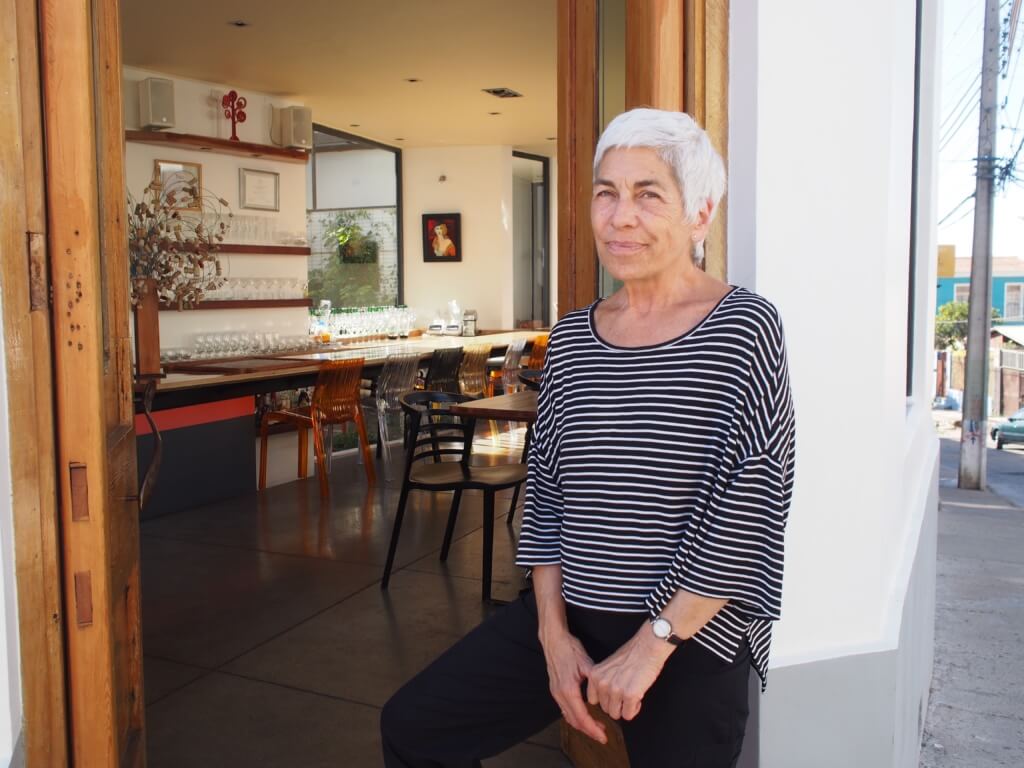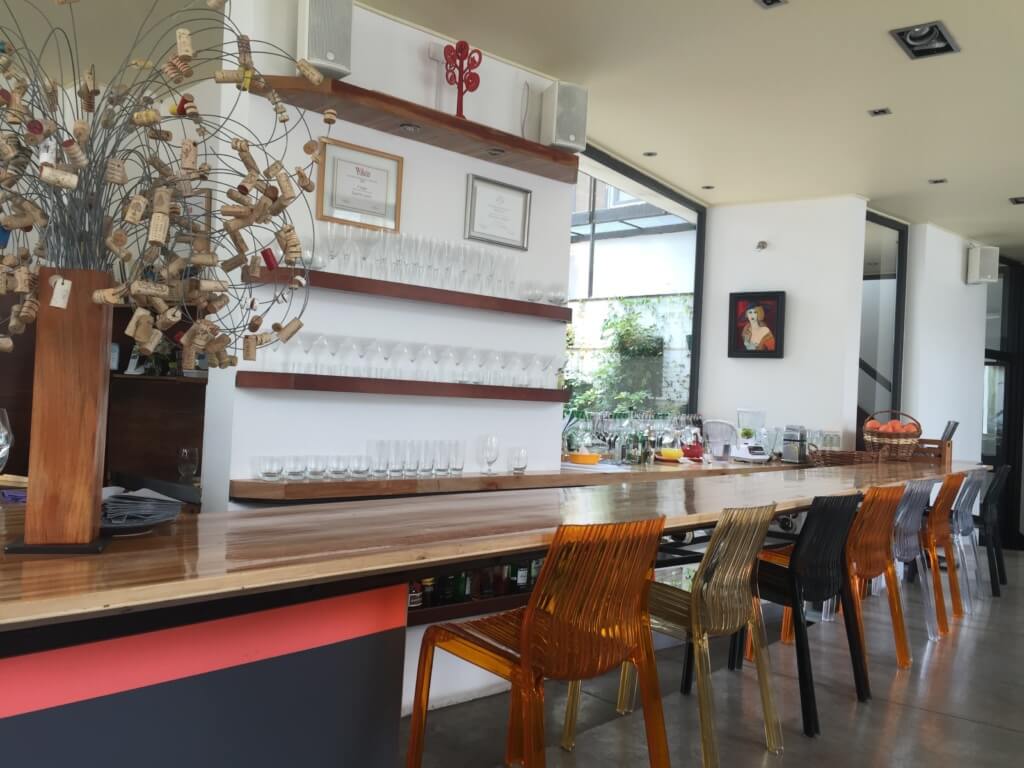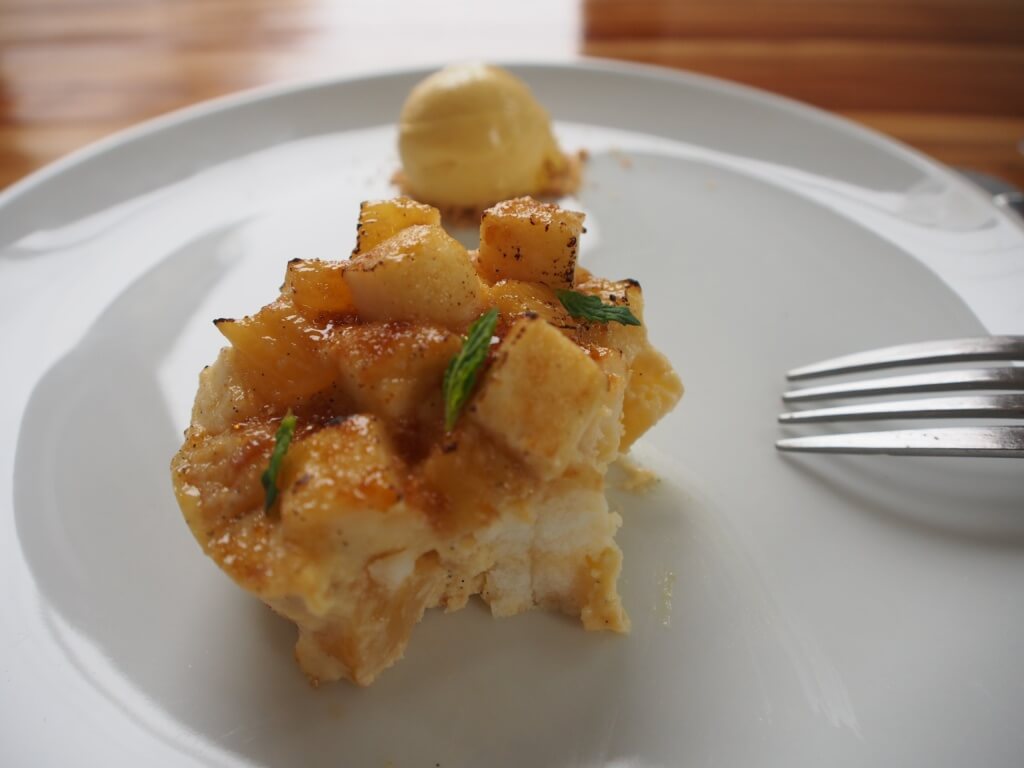“Without people,” Laura Moreno, part of the mother-son team that runs Espiritu Santo, one of the best restaurants in Valparaíso, “a city is a ghost town.” And without her, this restaurant—which sits on Cerro Bellavista, a hill in part of Valparaíso that gets a fair amount of foot traffic, from Chileans and foreigners alike—might be just another gourmet restaurant in a country that is proving its mettle these days in gastronomy circles.
Which is not to discount the food, cooked by Laura’s son, chef Manuel Subercaseaux. The menu is straightforward and perfect, created with fresh local ingredients. Every day the restaurant’s diver goes down to the bay, and brings back rockfish, local varieties known by the names vieja, alpargata and jerguilla, many of which are only found only in Southern Pacific waters. These fish, cooked and with just a touch of seasoning and herbs—no heavy creams or sauces—form the backbone of the menu. The rest is more mostly local ingredients, from mushrooms to herbs and greens. Explaining the ingredients to guests is a pleasure for Moreno, who could talk about food all day long.
“This is acelga,” she says, holding up smaller, more delicate leaves than I’ve ever seen in all the markets I’ve been to in Chile, explaining to a visiting couple that Swiss chard—which is not as common in other countries as it is here—“is very much like spinach.” It will accompany one of the fish dishes they choose as their main. My meal that day includes a ceviche with paico, a saw-leafed herb called epazote in Mexico, often consumed as a tea in Chile.

Laura Moreno posing in front of her restaurant, Espiritu Santo.
Moreno has been feeding people well for years. “I was a good cook in my time,” she tells me, “never a professional chef, but always interested in food.” When she first arrived in the United States in 1974, in exile with her husband from the Chilean dictatorship, she found fresh food hard to come by. In Massachusetts, she helped start one food co-op, later in Seattle, another, to bring in good, organic food at fair prices. After returning to Chile in the ‘80s, she worked to help build the first vegetarian restaurant in the country. Later, she’d go back to the states again, this time working with the President of Swarthmore College and his wife, coordinating events, including menu planning.
“They were foodies, and spent a lot of money on meals,” she says. She says she didn’t plan meals based on what she knew about Chilean food, but was more informed by places she’d lived and traveled. And the people she’d met, she says mischievously. “Remember, most of these dinners were for people who were going to give money to the college. So the first thing I did was investigate, like a detective. What does this person like? Do they have allergies? I would call their secretaries. I was even careful with the flowers—once I found out someone was allergic to lilies—so I made sure there were no lilies on the table.”
About her most recent return to Chile about five years ago, she’s very practical. “It wasn’t that I missed the mountains, my job in Philly was coming to an end, and I decided not to look for a job elsewhere in the states. I thought, if I start a new life, I should live in Chile. My kids and grandkids are here. In the end it’s [my] country.”
If choosing to come back to Chile was one easy decision, working with her son at the restaurant was another. For years they’d used Skype to keep in touch between visits, trading gastronomical tips. “We’d talk through how maybe you couldn’t get crème fraîche (for example) in Chile, but you could make your own,” she says. Subercaseaux had another successful restaurant on nearby Cerro Alegre, but then they found, bought and renovated the building where Espiritu Santo now sits on Cerro Bellavista.
Though she’s originally from Santiago, Moreno doesn’t just work on the hill; she lives there as well. As a member of the community, she says, it was easy to figure out what kind of restaurant would fit. No bars, nothing late, nothing loud. In fact, the neighborhood council only grants liquor licenses to people who live on the cerro. And while food, not alcohol is the main focus; the restaurant also has a great wine list, populated with nearby small-scale winemakers’ best vintages.
Over the course of the afternoon, as the lunch traffic has been slowly dwindling, Moreno keeps a keen and calm eye on the dining room. She gets up to write the bill for the last set of guests, and they talk as they’re packing up their things to head out into the late afternoon sunshine. Moreno and the couple are trading information, talking neighborhood wine stores in Manhattan where they might be able to find more of the wine they’ve had at lunch. Before leaving, the woman thanks Moreno again, saying, “We’ve been traveling for two weeks, and this has been the highlight of our trip.”
There’s no denying that Moreno herself is a free spirit. She’s had to pick herself and dust herself off a number of times, through exile, multiple international moves. But she meets every challenge. She tells the story of coming back to Chile and saying she couldn’t find the chili peppers she’d grown accustomed to using. So she found a workaround: she hid them in her suitcase, passing them through customs while chatting up the agricultural inspectors at the airport. “I think it’s because of my white hair,” she says, gesturing to her cropped haircut. “I snuck in peppers from Mexico, pasilla, chipotle, habañero. And they never found them. They think I’m an old lady, but I’m spry.”
Moreno insists it’s the restaurant people rave about, not her. She says it’s the freshness of the food, the clean layout, details like the fact that the tables are made from raulí beech from the original building’s beams that people remember.

One of Laura Moreno’s homemade dishes.
“But who do people thank for the food, who is the face of the restaurant, who do people say ‘me encantó’ (I loved it) to?” I counter. “Who do they greet simply and then say goodbye to with a traditional Chilean kiss on the cheek, exchanging ideas about food and life and living well?” She reluctantly concedes that I might have a point.
In Latin America, you often hear the expression “atendido por su dueño” (owner-run) as evidence that a restaurant or hotel is not in the hands of a disinterested third party. In contrast, because the owner is there, there’s the assumption that customers will be treated with cariño (loving care). In the case of Espiritu Santo, and with Laura Moreno at the helm, that couldn’t be more the case.

